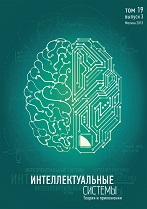|
|
Intelligent systems. Theory and applications, 2020, Volume 24, Issue 4, Pages 57–72
(Mi ista282)
|
 |
|
 |
Part 2. Special Issues in Intellectual Systems Theory
Classes of piecewise parallel functions containing all single functions
A. D. Otroschenko
Lomonosov Moscow State University
Abstract:
For a class of piecewise-parallel functions implemented by schemes of linear elements and Heaviside functions, an algorithm for checking the completeness of finite subsets supplemented by single functions is obtained. Thus, for this class solved the Slupetski problem
Keywords:
The piecewise-linear function piecewise-parallel function, the completeness problem, the Slupetski criterion.
Citation:
A. D. Otroschenko, “Classes of piecewise parallel functions containing all single functions”, Intelligent systems. Theory and applications, 24:4 (2020), 57–72
Linking options:
https://www.mathnet.ru/eng/ista282 https://www.mathnet.ru/eng/ista/v24/i4/p57
|

|




 Contact us:
Contact us: Terms of Use
Terms of Use
 Registration to the website
Registration to the website Logotypes
Logotypes








 Citation in format
Citation in format 